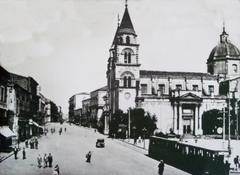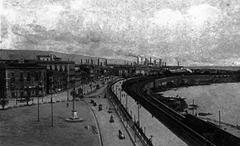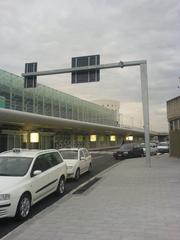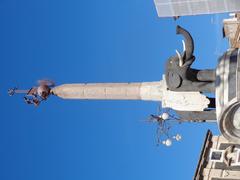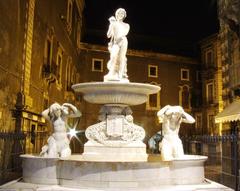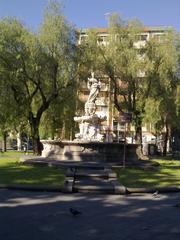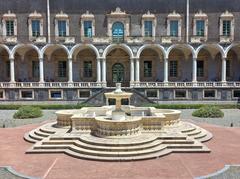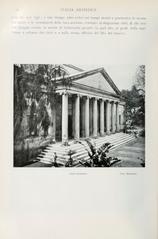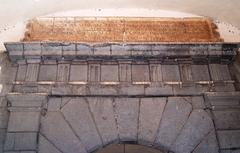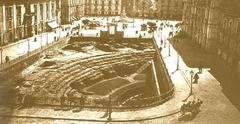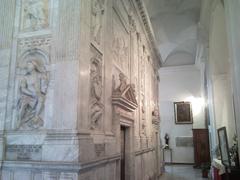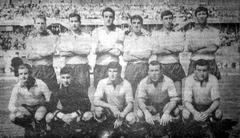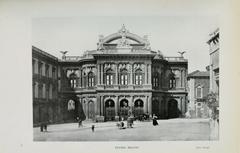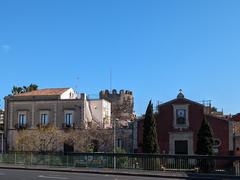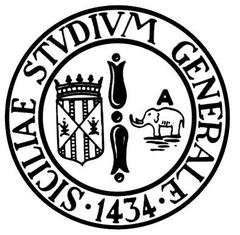Palazzo Anzalone-Polino Sant’Alfano: Visiting Hours, Tickets, and Historical Guide – Catania, Italy
Date: 14/06/2025
Introduction
Palazzo Anzalone-Polino Sant’Alfano—often simply called Palazzo Sant’Alfano—is a crown jewel of Catania’s UNESCO-listed Baroque center. Situated along Via Etnea, the city’s main thoroughfare, the palazzo offers a unique lens into Catania’s architectural rebirth after the devastating 1693 earthquake. Originally a noble residence, it now serves as both a cultural venue and a family-run bed and breakfast, inviting visitors to experience the legacy of Sicilian aristocracy, local legends, and Baroque artistry firsthand (UNESCO; Wonders of Sicily; palazzosantalfanobnb.com).
This guide delivers all the essential details for planning your visit, including historical context, architectural highlights, visiting hours, ticketing, accessibility, and recommendations for nearby attractions. Whether you’re a history buff, architecture enthusiast, or traveler eager to immerse yourself in local culture, Palazzo Sant’Alfano is not to be missed.
Table of Contents
- Origins and Historical Context
- Architectural Evolution and Features
- Social and Cultural Significance
- Visiting Information: Hours, Tickets, Accessibility
- Guided Tours and Special Events
- Tips for Photographers and Travelers
- Integration with Catania’s Historic Center
- Restoration and Preservation
- Frequently Asked Questions (FAQ)
- Conclusion
- References and Further Reading
Origins and Historical Context
Palazzo Sant’Alfano traces its roots to the early 17th century. Commissioned by the influential Anzalone, Polino, and Sant’Alfano families, it originally signified their power and prominence in Catania’s social hierarchy during the Spanish and Bourbon periods (palazzosantalfanobnb.com). The 1693 earthquake, which razed much of southeastern Sicily, spurred a citywide reconstruction and saw the palazzo rebuilt in the exuberant late-Baroque style that now defines Catania’s urban identity (Understanding Italy).
Architectural Evolution and Features
Exterior
- Facade: The building’s iconic bichrome facade utilizes local volcanic basalt and contrasting white marble, a hallmark of Catania’s Baroque architecture.
- Balconies: Ornate wrought iron balconies line the upper floors, offering both decorative flair and panoramic city views.
- Entrance: The grand portal is accessed via the Scala B staircase, elevating the piano nobile and reflecting the prestige of its former owners.
Interior
- Reception Halls: High ceilings, intricate stucco work, parquet floors, and period furnishings preserve the historical ambiance.
- Original Artworks: Many rooms feature paintings and decorative motifs by Sicilian artist Maria Tina Aldisi, with each guest room themed around local legends (palazzosantalfanobnb.com).
- Garden Terrace: A tranquil interior terrace offers respite from city bustle and panoramic views.
Social and Cultural Significance
Palazzo Sant’Alfano was historically a hub for Catania’s aristocracy, hosting salons, intellectual gatherings, and artistic events that helped shape the city’s vibrant cultural scene. Its grand halls and courtyards have welcomed generations of artists, writers, and musicians, fostering the exchange of ideas and the celebration of Sicilian traditions. Today, the palazzo’s role as a bed and breakfast and event venue continues this legacy, blending hospitality with cultural programming (Wonders of Sicily).
Visiting Information: Hours, Tickets, Accessibility
- Location: 28 Via Etnea, Catania, a short walk from Piazza Duomo and other major sites.
- Visiting Hours: Open Tuesday–Sunday, 10:00 AM–5:30 PM (last entry 5:00 PM). Closed Mondays and public holidays. Hours may vary for special events—check the official website before visiting.
- Tickets: General admission €8; discounts for students, seniors, and groups; children under 12 free. Overnight guests of the B&B have complimentary access. Tickets can be purchased onsite or online (palazzosantalfanobnb.com).
- Guided Tours: English and Italian tours at 11:00 AM and 3:00 PM daily. Advance booking recommended.
- Accessibility: The main floors are wheelchair accessible via elevator. Some upper levels may be less accessible—contact the visitor center for assistance.
- Photography: Non-flash photography is permitted in most areas. For professional shoots or tripods, permission is required.
Guided Tours and Special Events
- Guided Tours: Offer deep dives into the palazzo’s history, legends, and restoration efforts.
- Cultural Evenings: Regularly scheduled events highlight Sicilian traditions, music, and gastronomy.
- Educational Programs: Workshops for adults and children explore Baroque art, architecture, and local folklore.
Tips for Photographers and Travelers
- Best Light: Mornings and late afternoons highlight facade details and cityscapes from balconies.
- Footwear: Wear comfortable shoes for exploring cobblestone streets.
- Weather: Catania’s climate is warm much of the year, but check forecasts and dress accordingly.
- Nearby Amenities: Cafés, shops, and public transport are readily available in the immediate vicinity.
Integration with Catania’s Historic Center
Palazzo Sant’Alfano’s location on Via Etnea makes it an excellent anchor for exploring Catania’s historic core:
- Piazza Duomo & Cathedral of Sant’Agata: Catania’s religious and civic heart.
- Castello Ursino: Medieval fortress and museum.
- Roman Amphitheater: Ancient remains highlighting the city’s layered history.
- Via Etnea: Lively avenue lined with Baroque palaces, cafés, and boutiques.
Restoration and Preservation
Ongoing restoration projects have preserved original architectural details while integrating modern comforts for guests. The palazzo’s private management ensures both daily maintenance and respect for historical authenticity. Restoration work is sometimes highlighted in special exhibitions or guided tours, offering visitors a behind-the-scenes look at conservation efforts (Wonders of Sicily; palazzosantalfanobnb.com).
Frequently Asked Questions (FAQ)
Q: Can I visit Palazzo Sant’Alfano without staying overnight?
A: Yes, daytime visits and guided tours are open to non-guests. Booking in advance is suggested.
Q: Is the palace fully accessible for those with mobility issues?
A: The main floors are accessible via elevator; some upper sections may require stairs. Contact staff for detailed accessibility information.
Q: Are guided tours included in the ticket price?
A: Guided tours require a separate ticket or booking; check the website for times and fees.
Q: Is photography permitted?
A: Yes, but without flash. Professional equipment requires permission.
Q: What are other must-see nearby sites?
A: Catania Cathedral, Piazza Duomo, Castello Ursino, and the Roman Amphitheater are all within walking distance.
